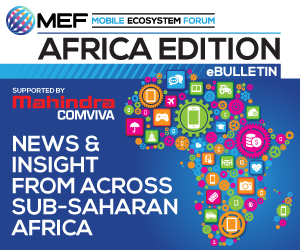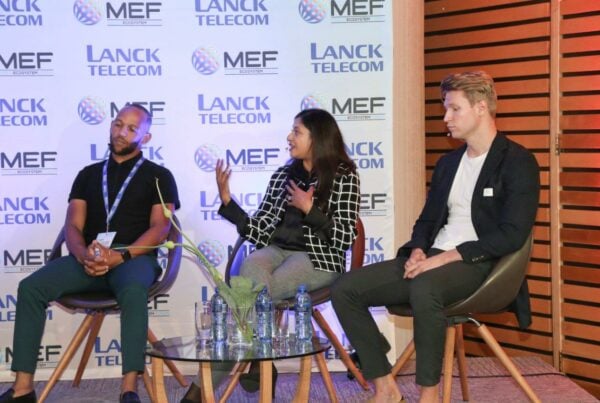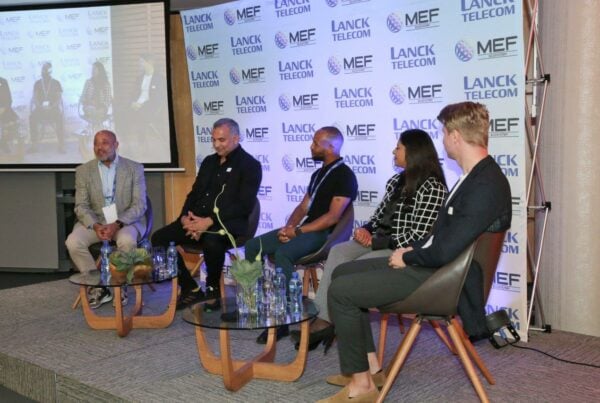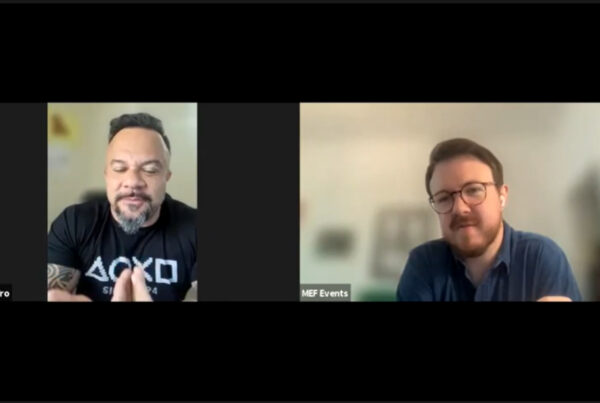Last month, MEF hosted the fourth annual MEF Connects Africa during AfricaCom week in Cape Town, where MEF members and guests gathered to discuss the African mobile ecosystem an the opportunities and challenges it faces.
We asked some of the attendees for their take on the mobile situation in Africa and how they see the developing future of the ecosystem across some of the fastest growing markets in the world.

Adia Sowho
Director, Digital Business
Etisalat Nigeria
Adia Sowho, Director Digital Business, Etisalat Nigeria
Piracy in a developed market eats away at an existing pie, but in Africa, the impact is more devastating because these industries are nascent. Nollywood (Nigeria) and Swahiliwood (Tanzania) are decimated of value even as their movie-making identities are born.
Digital content is tough to monetize on a normal sunny African day, but add low smartphone penetration and infancy of carrier billing to the existing issues of piracy and over-populated app stores, and it seems like an impossible problem to solve.
So what do we do? Check out this post on going back to the basics – what does content do? Content can 1) Entertain 2) Educate 3) Inspire or 4) Convince. The value is out there, but how is it spread across these buckets and how can we extract it.
The value chain must focus on what customers value, rather than on the illusions of returns from elsewhere. Our Africa is different and we have to recognize that. Content cannot cost the same globally, when the customers’ affordability and distribution channels differ drastically. Profits look different in every market – and that needs to be okay because if content is limited to markets that can afford a single or dollar-based price tag, we will never find that killer app that captures the beauty of Africa – its 1 billion people!
Streaming sells in developed markets, but consumers not paying per kb, we are. Some artists also protest the streaming payment model because the more folks listen, the less they get paid from the shared revenue pool. But in Africa, we generally pay per kb, this means that artists don’t suffer the same dilution effects and get paid more. How do we educate the vast populace to buy music this way and grow the pie?
We need to keep talking to keep finding these opportunities but it means flipping our thinking sometimes to capture value.
James McNab
Managing Director Africa & Chief Communications Officer
Basebone
James McNab, Managing Director Africa & Chief Communications Officer, Basebone
Africa as a market place continues to grow year on year. A recent report by the International Data Corp (IDC) claims that 47% of devices sold in Africa during the 1st quarter of 2015 were smartphones, with the Android OS having an impressive 89% market share.
The entrance of affordable smartphones alongside the continued sales of the traditional feature phones allows creators and suppliers of mobile entertainment services, mHealth , educational and Mobile Money applications to offer their services across a broader user base. 45.1% of all smartphones shipped across Africa during the 1st quarter were priced below $100 USD and this jumps to 75% at under $200 USD.
Two of Basebone’s key markets – Nigeria and South Africa – account for 14% and 12% market share – and creates exponential opportunities for advancing mobile content services across the region.
Rimma Perelmuter
CEO
MEF
Rimma Perelmuter, CEO, MEF
Mobile continues to be a game changer for Africa and the recently held AfricaCom gathering certainly highlighted the key opportunities and challenges which lie ahead for the Continent.
At MEF, we believe that the best opportunities for unlocking mobile’s potential lies in facilitating partnerships and knowledge sharing between global, regional and local ecosystem players including connecting established mobile businesses, innovators and new entrants from traditional sectors such as banking, health and education – all keen to mobilise and engage a broad mix of African consumers.
Hence, MEF’s 4th MEF Connects Africa event gathered the best and brightest for an exclusive night of networking and partnering opportunities. It was exciting to hear conversations amongst MEF’s members looking to extend their Africa presence into markets such as Botswana, Madagascar and Angola whilst launching more sophisticated services for mobile consumers in the more established markets such as South Africa, Kenya, and Nigeria. Providing compelling local content, video and interoperable mobile money services to a wide range of pre-paid and growing smartphone audiences dominated most of the conversations. Equally, mobile will continue to drive digital inclusion and social impact across the Continent with announcements like Facebook’s partnership with Airtel now due to introduce Basic Services to consumers across 17 markets.
The need for partnering and scaling was reinforced during MEF’s Africa Steering Committee meeting, during which members identified pan-African growth as their number one priority and asked MEF to continue its support of regional analytics, market entry facilitation, innovation and knowledge sharing. MEF’s forthcoming guide on market entry into Nigeria in collaboration with KPMG was identified as important to unblocking entry barriers and regulatory hurdles which may otherwise stifle innovation and market development.
We look forward to working with members to unlock mobile’s full potential and drive impact across Africa.
Silvio Kutic
Founder & CEO
Infobip
Silvio Kutic, Infobip founder and CEO
The mobile ecosystem in Africa is seeing diverse and dynamic activity as one of the most innovative arenas for mobile services. A range of companies are developing new solutions and partnership models, and the potential is still beyond compare.
We believe those businesses able to co-operate, adapt and see the complexities of the industry – which often means working with partners to gain advantage – will be more prosperous. Regulation in key markets is also likely to impact further developments. Nigeria, South Africa, Kenya, Tanzania and Ghana remain key hubs in many respects. Companies are increasingly looking at the Pan-African opportunity, but still there’s a lot of uncertainty as to how to approach it.
In the telecoms sphere, monetization of A2P messaging potential is taking a new turn. There’s a growing demand to launch the service fast, avoid capital expenditure and minimize risk. Disruptive, innovative models are sought after; as the market accelerates, even the largest and most traditional of stakeholders are adopting out of the box strategies to maximize the opportunity. The emerging Business-as-a-Service model could be a solution to benefit all the stakeholders.
With this trust in place, the promises of what Big Data can deliver will be realised to the benefit of all.
Download the Free MEF Africa eBulletin now
Supported by Mahindra Comviva, download our quarterly eBulletin for unparalleled insight into the African mobile ecosystem and the the opportunity for mobile growth and innovation, with news and market data from across the continent.
Filled with insights, interviews and opinion from industry experts, the regional spotlight will help to understand how the pan-African mobile ecosystem is taking shape across 54 countries united by an entrepreneurial spirit and an insatiable mobile-first appetite.







